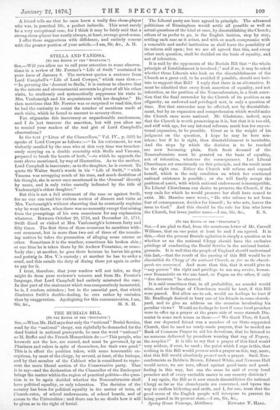THE BURIALS BILL.
[TO THE EDITOR OF TEE "SPECTATOR."] Sin,—When Mr. Hall says that only the "national" Burial Service, read by the "national" clergy, can rightfully be demanded for the dead buried in national graveyards, he uses the word "national" as M. Buffet and the French Monarchists do :—" This people, who knoweth not the law, are cursed, and must be governed_by us Pharisees and rulers in spite of themselves, for their own good." This is in effect the position taken, with some honourable ex- ceptions, by most of the clergy, by several, at least, of the bishops, and by that member of the Cabinet who is considered to repre- sent the more liberal section of the Conservative party. That is to say—and the declaration of the Chancellor of the Exchequer brings the matter within the region of practical politics—the ques- tion is to be again decided whether the Nonconformists shall have political equality, or only toleration. The decision of the country has been for political equality in the matter of tests, of Church-rates, of school endowments, of school boards, and of access to the Universities ; and there can be no doubt how it will be given as to the right of burial.
The Liberal party are here agreed in principle. The advanced politicians of Birmingham would settle all possible as well as actual questions of the kind at once, by disestablishing the Church ; others of us prefer to go, in the English fashion, step by step, settling each case as it arises, and with so much compromise with a venerable and useful institution as shall leave the possibility of its reform still open ; but we are all agreed that this, and every other such question, shall be decided on the basis of equality, and not of toleration.
It is said by the opponents of the Burials Bill that " the whole principle of Establishment is involved ;" and if so, it may be asked whether those Liberals who look on the disestablishment of the Church as a great evil, to be avoided if possible, should not hesi- tate to support that Bill? I reply that there is an alternative. It must be admitted that every fresh assertion of equality, and not toleration, as the position of the Nonconformists, is a fresh eager- tion that the final surrender by the Church of its position as an oligarchy, an endowed and privileged sect, is only a question of time. But that surrender may be effected, not by disestabliah- ment, but by an expansion and comprehension which would make the Church once more national. Mr. Gladstone, indeed, says that the Church is worth preserving as it is, but that it is too old, and stiff with a,ge, for any internal reforms, much less for any ex- ternal expansion, to be possible. Great as is the weight of his judgment on the question, I hope he may be here mis- taken; but if he is right, then disestablishment is inevitable. And the steps by which the decision is to be reached are now becoming plain. Each fresh demand of the Nonconformists must be granted on the basis of equality, not of toleration, whatever the consequences. Let liberal Churchmen act consistently on this principle, and the result must be the right one. Either the Church will reform and expand herself, which is the only condition on which her continued national existence is possible ; or she will finally accept the position of a sect, with which national endowment is incompatible. No Liberal Churchman can desire to preserve the Church, if the very ends for which he would preserve her shall have ceased to exist. Mr. Maurice once wrote, "He who refuses to act from fear of consequences, decides for himself ; he who acts, leaves the issue to God." And this should be the rule for him who loves
the Church, but loves justice more.—I am, Sir, &c., E. S.


































 Previous page
Previous page